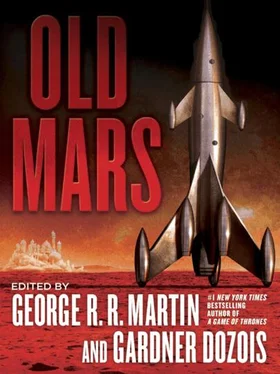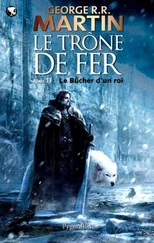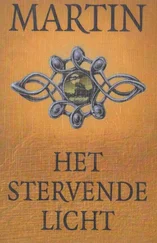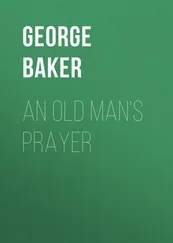 His (and their, and my) next day of the trip would bring us to our goal—changed though it was since their time.
His (and their, and my) next day of the trip would bring us to our goal—changed though it was since their time.
On old maps of Mars, Solis Lacus (The Lake of the Sun) was a bright circular feature in the midst of a darker area, thought at the time to be an irrigated, heavily vegetated patch, with the stark circularity of Solis Lacus in its midst.
We now know that the dark part was heavy volcanic dust and ash and the bright roundness a raised area swept by winds and kept clear.
In Oud’s time, it was a long fold of the edge of the old bottom of a remnant sea, like prehistoric Lake Bonneville on Earth. As they rolled toward it, Oud said, “Ancestors described the wonder and majesty of (Old Bitter Sea) with its rolled margin of amaranth and turquoise gleaming in the sunset after a long day’s slimshanging . Now it’s an almost featureless rise of the landscape, hardly worth a second two-looks.”
Oud reefed his sail as they slid out onto the brightness of the middle of Solis Lacus.
Bud said, “It is quiet here, Father.”
“Indeed,” said Oud, “for here is where it started.”
“Were you born here, Father?”
Oud looked around.
“We were all born here,” said Oud. He pointed to the raised lump in the cold distance. “That is where the Life-Rock fell from the sky. From where we, and all living things, come. In the ancestors’ days, we returned each year for the Festival of Wow, to appreciate that, and to think and wonder on its happening. It must have been something, then, all the nests gathered, all hooting and racket, such music as they had.”
“Are you sad, Father?” asked Bud.
“Sadness is for those who have personally lost something,” said Oud. “How can I be sad? I have made a fine journey in a good slimshang , in the low season. I have arrived at the place of our First-Birth. And I have a new bud-son who will live to see other wonders on this elder twilight world. How could I be sad?”
“Thank you for bringing me here,” said Bud.
“No,” said Oud, “thank you.”
Weeton here again. We leave Bud and Oud in a sort of valetudinarian idyll (I like to think), staring into the setting sun with Solis Lacus around them, and Thyle I and II far away.
Meanwhile, I’m out here on this empty rise where the edge of a sea once rolled, trying to find what is dragging on my retro- slimshang . The sun is setting here, probably adding to my anthropomorphization of those two Martians now dead four hundred thousand years.
After exploring the Life-Rock for a day (“If you’ve seen one rock, you’ve seen them all”—Oud), his narrative ends two days into the return journey back to Tharsis.
Oud, as far as we can find so far, never wrote another word.
Bud, except for his appearance in Oud’s narrative, is unknown to history or Martian literature.
I hope, so far as I’m able, that they lived satisfying, productive Martian lives.
We’ll never know. While Mars and the Martians were dying, we were still looking up, grunting, out of the caves, at the pretty red dot in the sky.
1 Well put. Weeton’s guess was fairly accurate, one of the few times early colonists and philologists were. Other places, he’s less reliable.
2 Elenkua N’Kuba, ed. Weeton’s Oud Narrative: A facsimile reproduction. Elsevier, the Hague: 2231.
James S. A. Corey is the pseudonym of two young writers working together, Daniel Abraham and Ty Franck. Their first novel as Corey, the wide-screen space opera Leviathan Wakes , the first in the Expanse series, was released in 2010 to wide acclaim, and was followed in 2012 with a new Expanse novel, Caliban’s War . Coming up is another Expanse novel, Abaddon’s Gate .
Daniel Abraham lives with his wife in Albuquerque, New Mexico, where he is director of technical support at a local Internet service provider. Starting off his career in short fiction, he made sales to Asimov’s Science Fiction, SCI FICTION, The Magazine of Fantasy & Science Fiction, Realms of Fantasy, The Infinite Matrix, Vanishing Acts, The Silver Web, Bones of the World, The Dark, Wild Cards , and elsewhere, some of which appeared in his first collection, Leviathan Wept and Other Stories . Turning to novels, he made several sales in rapid succession, including the books of The Long Price Quartet, which consist of A Shadow in Summer, A Betrayal in Winter, An Autumn War , and The Price of Spring . At the moment, he’s published the first two volumes in his new series, The Dagger and the Coin, which consists of The Dragon’s Path and The King’s Blood . He also wrote Hunter’s Run , a collaborative novel with George R. R. Martin and Gardner Dozois, and, as M. L. N. Hanover, the four-volume paranormal romance series Black Sun’s Daughter.
Ty Franck was born in Portland, Oregon, and has had nearly every job known to man, including a variety of fast-food jobs, rock-quarry grunt, newspaper reporter, radio advertising salesman, composite-materials fabricator, director of operations for a computer manufacturing firm, and part owner of an accounting-software consulting firm. He is currently the personal assistant to fellow writer George R. R. Martin, where he makes coffee, runs to the post office, and argues about what constitutes good writing. He mostly loses.
In the tense story that follows, they show us that “honor” can mean many different things to many different people—and to nonpeople too.
A Man Without Honor
JAMES S. A. COREY
For the exclusive eyes of George Louis, by the Grace of God King of Great Britain, France, and Ireland30 September 172–Your Majesty, I was once an honorable man.
I do not wish at this late date to recount the circumstances under which Governor Smith revoked my Letter of Marque, nor the deceptions by which I was then forced to choose between my loyalty to the crown or my honor as a gentleman. I made my choices then, and I have accepted the consequences of them. For the greater part of a decade, I have led my crew through Caribbean waters, the forces of personal loyalty, despair, and rude vengeance changing me as a caterpillar in its chrysalis into the debased, cruel, and black-hearted man that I was accused of being long before it was true. I have sunk a dozen ships. I have ransomed members of your own family. I have taken what was not mine by right but by necessity. I have no doubt that you have heard my name spoken in tones of condemnation, and rightly so, for I have made that original calumny true a hundred times over. Nor shall I pretend any deep regret for this. My loyalty and care were rewarded with betrayal, and though it be a defect of my soul, such a trust once broken with me can never be mended.
I have likewise no doubt that on this, the occasion of Governor Smith’s death, some part of the credit or blame for his demise might be attributed to me. I write to you now not to ask pardon for that which I have done or defend myself against accusations of which I am innocent. It is my sole hope that you shall read my words and through them understand better the circumstances of the governor’s death and my own role in it. I only ask that as you read this you bear in mind these two things: I swear before God that, though he had earned my vengeance a thousand times over, it was not my hand that slew the governor, and that I was once an honorable man.
Picture, then, my ship, the Dominic of Osma , as she rode upon the August waves. A hurricane had assaulted the coast three days earlier, and water and air held the serenity that only comes after such a storm or before it. The sun shone with a debilitating heat, looking down upon our poor sinners’ heads like the eye of an unforgiving God or else His counterpart, and we rode upon a sea whose blue echoed the sky. I recall feeling a profound peace as we moved between these two matchless vastnesses. I had a hold stocked with salt pork, freshwater, limes, and rum. I had a crew of men whose loyalty and ability I had reason to trust. We might have spent weeks upon the sea without sighting land or fellow vessel before I felt the first pang of anxiety.
Читать дальше

 His (and their, and my) next day of the trip would bring us to our goal—changed though it was since their time.
His (and their, and my) next day of the trip would bring us to our goal—changed though it was since their time.










